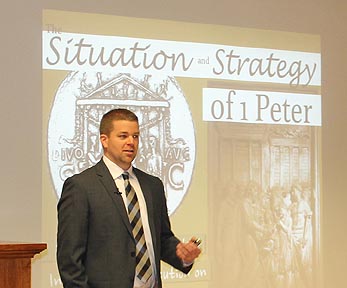
Dr. Travis Williams provides an introduction into the study of I Peter, which is the focus of this year’s Theologian-in-Residence lecture series.
Understanding the world of early Christians, the importance of I Peter and a social-scientific reading of the New Testament epistle were among the topics discussed Tuesday during the first session of the Theologian-in-Residence lecture series at Tusculum College.
“The main purpose for this series is not looking at what I Peter teaches but why it says what it says,” said Dr. Travis Williams during the lecture. “That is a deeper question and a more important question.” Dr. Williams, assistant professor of religion, is leading the annual lecture series, now in its 24th year and sponsored by Tusculum College with partial funding from Ron Smith.
While I Peter is not one of the most studied books of the New Testament, it is an important part of the Bible, Dr. Williams said. The epistle is key in understanding the legal status of Christians in the First Century and provides an important glimpse into the formation of Christian identity in the early church, he explained The book is also one of the earliest attempts by a Christian author to construct a response to anti-Christian prejudice as he encourages his readers to do good.
People often visualize the authors of Biblical texts as theologians who wrote in seclusion as they awaited inspiration from God. However, Williams said, “Biblical authors were influenced and shaped by their world. It is important for us to step back and look at that world.”
A way to do that is through a social-scientific reading of the Bible, he noted. In the 1980s, Biblical scholars began to draw on the social sciences to provide a new lens for interpreting texts, to look at the social and cultural context of the scriptures to better understand the world in which they were originally written and read.
The book of I Peter was written around 65 – 67 C.E. from Rome to Christians in the provinces in Asia Minor, an area that is now found primarily in modern day Turkey. The epistle is a circular letter shared with different churches in the area, Williams explained.
Most Biblical scholars agree that I Peter was written in response to persecution and that this persecution was local, sporadic and took the form of general harassment and antagonism by the general populace, he noted This position comes from a view that the first governmental persecution came in 250 C.E. under the rule of Decius.
However, Williams said, he disagrees with this position because through his study he has discovered evidence that does not fit the “official” and “unofficial” categories used by most Biblical scholars to classify persecution. For example, historical accounts of the governorship of Pliny include incidents when individuals were brought into court on the charge of being a Christian by another citizen, not by the government. The Christians who did not recant their faith were executed.
A way to read I Peter to try to understand what led to its writing is mirror reading, Williams said. Mirror reading is a method to try to piece together both sides of a conversation from a one-sided document. Combining the information provided by I Peter with the historical accounts of the Greco-Roman world of the time, it is possible to put together a broad picture of what early Christians faced and what their suffering was like, he said.
The details of that persecution will be the focus of Dr. Williams’ next session on Tuesday, Feb. 11. The series continues on Feb. 18 with a session exploring the social strategy found in I Peter and will conclude Feb. 25 with a look at the function of good works in the New Testament epistle.
The sessions begin at 10 a.m. in the Chalmers Conference Center in the Niswonger Commons on the Tusculum College campus. There is no charge to attend the lecture series, but reservations are required as lunch is provided in the college’s cafeteria. For more information or to register, please call 423-636-7304 or email eestes@tusuclum.edu.


